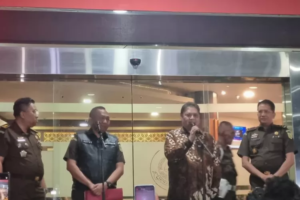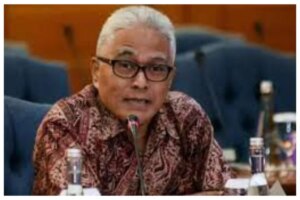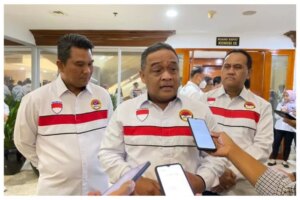Arief Hidayat’s Dissenting Opinion Cannot Be a Legal Basis for Changing the Legislative Election System

[ad_1]
BONSERNEWS.com – Member of Commission II DPR RI from the PAN faction Guspardi Gaus, considered that a dissenting opinion by one of the 8 Constitutional Court (MK) judges, namely Arief Hidayat, when deciding on a judicial review related to the electoral system could not be a legal basis for changing the legislative election system (Pileg ) which has been decided by the Court.
Of the 9 MK judges, one person (Wahihiddun Adams) was unable to attend due to the MK’s assignment abroad. So that the case was decided by 8 MK judges.
Mr. Arief Hidayat did have a different opinion from the 7 other constitutional judges, in which he supported and agreed with the reasons for the applicant’s wish to change the open proportional system to a closed one. “Pak Arief’s Dissenting Opinion will not reduce the value of the current MK decision,” said Guspardi, Monday 19 June 2023.
Also Read: The Constitutional Court’s decision regarding the election system must be welcomed by parties with the political education of candidates
According to him, the Constitutional Court’s decision has clearly and decisively rejected all applications submitted by the applicant for judicial review of several articles in Law No. 7/2017 concerning Elections with case number 114/PUU-XX/2022.
The Constitutional Court’s final decision is constitutive or interpreted as a decision that ends a case being tried. Where the nature of the Constitutional Court’s decision is final and binding, explained the PAN Politician.
Also Read: The Election System Remains Open, PKB Candidates Call the MK Wise Decision
The legislator from West Sumatra also explained that in essence a dissenting opinion is a manifestation of the independence of the judicial power, namely the independence of judges in making a decision.
Then the question is, can a dissenting opinion which is categorized as a different judge’s consideration be used as a legal basis for reference? Yes definitely not.
However, the dissenting opinion was still included as part of the Constitutional Court’s decision. This is stated in the Constitutional Court Regulation No. 06 of 2005 in Article 33 letter G, it is stated that a dissenting opinion must be included in the decision (if any), commented Mr. Gaus.
Therefore, different considerations or opinions of members of the Constitutional Court judge Arief Hidayat must be seen as a form of judge’s independence in assessing a case. And that is the judge’s interpretation and interpretation that must be respected together.
However, it still cannot be used as a reference for legal basis because it is in a position contrary to the verdict of the Constitutional Court which is final and binding.
Once again, what can be used as a legal basis is the Constitutional Court’s decision which has decided that the electoral system will continue to use an open proportional system, concluded the member of the Baleg DPR RI.
Previously, during the pronouncement hearing of Arief’s decision, he stated that from an ideological, philosophical, sociological and juridical perspective regarding the Indonesian democratic system, namely Pancasila democracy, especially the fourth precept, he proposed that an open proportional system be sufficiently used until the 2024 Legislative Election. ()




